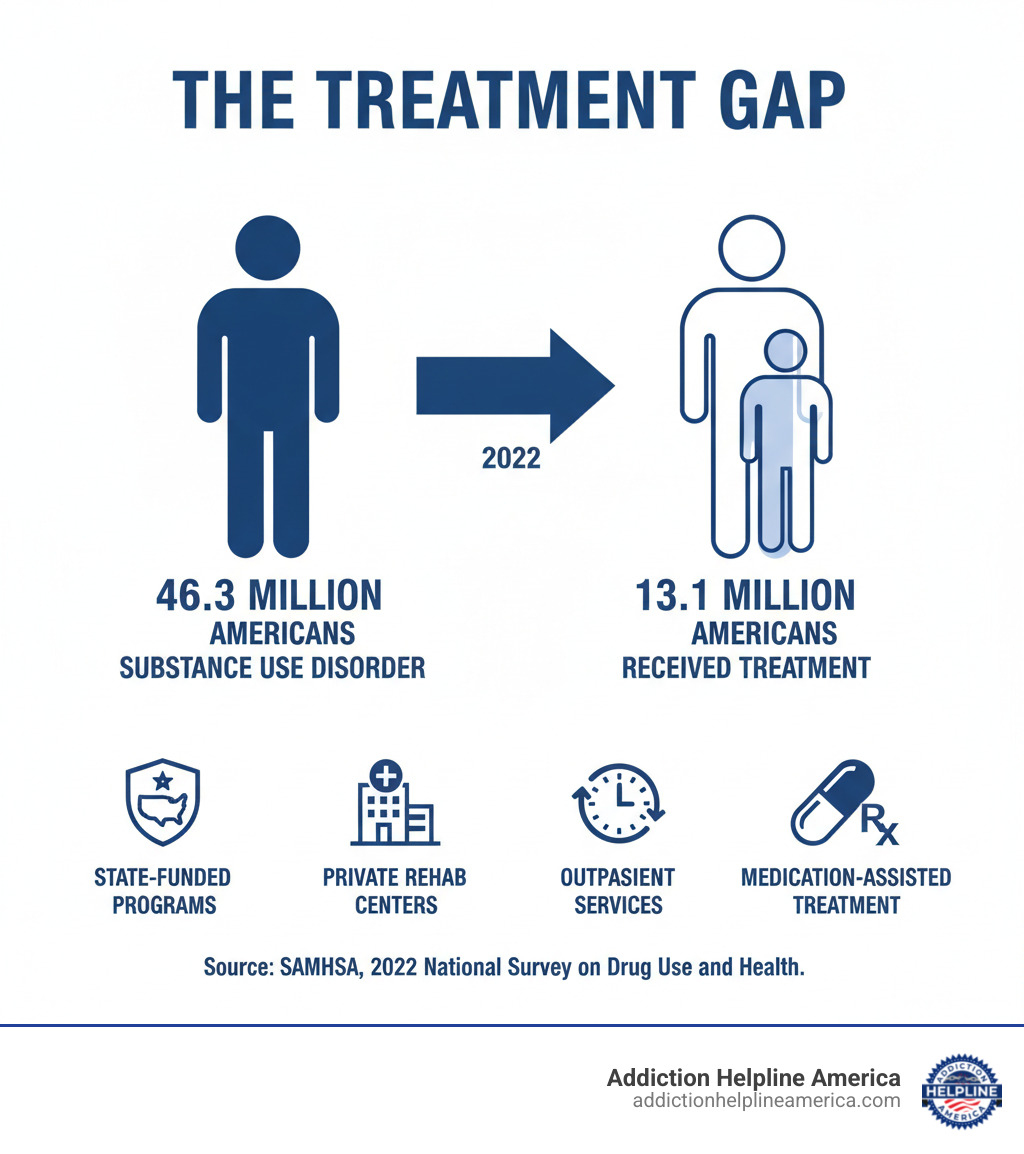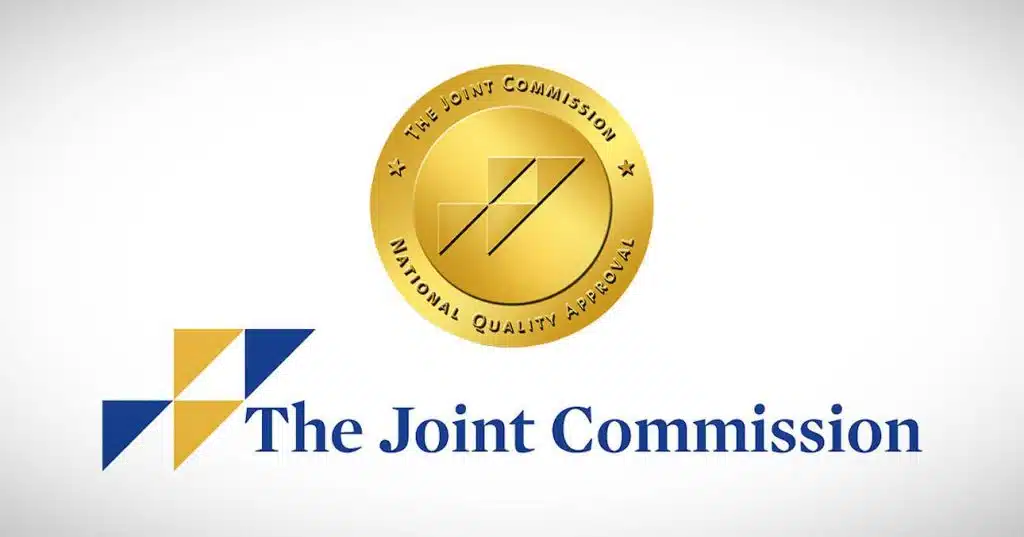
Why Finding the Right Rehab Facility Matters Now More Than Ever
When you need to find a rehab facility, start with these trusted resources:
- Addiction Helpline America: Call 1-844-561-0606 for free, confidential treatment referrals.
- FindTreatment.gov: Anonymously search for facilities by location and treatment type.
- State Substance Use Agencies: Contact your state’s agency for local treatment options.
- Crisis Support: Call or text 988 for the Suicide & Crisis Lifeline for immediate help.
- Insurance Verification: Contact your insurance provider to confirm coverage.
The numbers are sobering: in 2021, 46.3 million Americans had a substance use disorder, yet only a fraction received the treatment they needed. This treatment gap contributes to hundreds of preventable deaths every day.
You don’t have to be a statistic. Recovery is possible, and it starts with finding the right facility for your specific needs and circumstances.
Navigating the addiction treatment landscape—from state-funded programs to private facilities—can feel overwhelming, especially in a crisis. This guide simplifies the process, offering seven practical ways to find a rehab facility that’s right for you or your loved one.
At Addiction Helpline America, our specialists provide confidential, 24/7 guidance to connect you with treatment resources that can save a life.

Must-know find a rehab facility terms:
1. Understand the Different Levels of Care
Addiction treatment isn’t one-size-fits-all. It’s a spectrum of care designed for different needs. When you find a rehab facility, matching the intensity of treatment to your situation is key.

Here are the primary levels of care:
- Medical Detoxification: Provides 24/7 medical supervision to manage withdrawal symptoms safely. It’s the first step to get you medically stable for treatment.
- Inpatient/Residential Treatment: You live at the facility for 30-90+ days, immersed in a structured environment of therapy and support, free from outside triggers.
- Partial Hospitalization (PHP): Intensive treatment during the day (5-6 hours, 5 days a week) while you return home at night. It’s a step down from inpatient care.
- Intensive Outpatient (IOP): A flexible option with several hours of therapy a few times per week, allowing you to maintain work or family commitments.
- Standard Outpatient (OP): The most flexible option, involving therapy once or twice a week. It’s ideal for milder issues or as a step-down from more intensive care.
- Aftercare: Ongoing support after a program ends, including alumni groups, sober living, and support groups like AA/NA. Quality facilities integrate aftercare planning into treatment.
Choosing the Right Level for Your Needs
How do you know which level is right? Consider these factors: the severity of your addiction, any co-occurring mental health disorders (like depression or anxiety), your personal responsibilities, and your home environment. If you’ve tried one level of care and relapsed, it may be time to step up to a more intensive option. You don’t have to figure this out alone. Most treatment centers, including our team at Addiction Helpline America, offer free assessments to help recommend the right level of care for your unique situation.
2. Use Trusted National and State Resources to Find a Rehab Facility
You don’t have to search for help alone. Free, confidential, and anonymous resources exist to guide you.
- FindTreatment.gov: Authorized by the 21st Century Cures Act, this is a comprehensive, anonymous search tool for treatment facilities across the U.S. You can filter by location, treatment type, and payment options.
- SAMHSA’s National Helpline (1-800-662-HELP): This 24/7 helpline provides free, confidential treatment referrals and information.
- State Substance Use Agencies: Each state has an agency that manages state-funded programs and provides information on licensed local treatment options. For example, you can find resources through Alaska’s health department or Arkansas’s Office of Substance Abuse and Mental Health.
After identifying potential facilities, call them directly to verify their services and availability. Always check for proper state licensing to ensure they meet minimum standards of care.
Finding Specialized Treatment Programs
Sometimes, general treatment isn’t enough. Many programs specialize in specific needs. If you’re struggling with opioid addiction, SAMHSA offers a Buprenorphine Practitioners locator and an Opioid Treatment Program Directory. For co-occurring disorders (substance use and mental health issues), find a facility that offers integrated treatment. Veterans can find specialized support through the Veterans Crisis Line (call 988 and press 1). There are also programs custom for LGBTQ+ individuals, pregnant women, adolescents, and other specific populations. At Addiction Helpline America, we can help you steer these resources to find a program that truly fits.
3. Compare State-Funded vs. Private Rehab Options
When you’re trying to find a rehab facility, you’ll encounter two main types: state-funded and private. Both aim for recovery but differ in cost, access, and amenities.
State-funded rehab programs are supported by government funds and are designed for those with limited financial resources or no insurance. They often prioritize high-risk populations, like pregnant women. The main advantage is the low cost, but they may have long waitlists and basic accommodations.
Private rehab facilities are funded by insurance and private payments. They typically offer immediate admission, more amenities (like private rooms and holistic therapies), and a wider range of services. However, the cost can be substantial without good insurance coverage.
Here’s a quick comparison:
| Feature | State-Funded Rehab | Private Rehab |
|---|---|---|
| Cost | Free to low-cost based on income; sliding scale fees common | Can be expensive without insurance; thousands per week for private pay |
| Wait Times | Often weeks to months, especially for non-priority cases | Usually immediate to within a few days |
| Amenities | Basic accommodations; shared rooms common; focus on essential services | Private or semi-private rooms; may include pools, gyms, spa services, gourmet meals |
| Services Offered | Evidence-based therapies, group counseling, medical care, case management | All standard services plus holistic therapies, specialized programs, extensive aftercare planning |
Neither option is better; the right choice depends on your financial situation and urgency.
How to find a rehab facility using state funding
To access state-funded treatment, you’ll typically need to meet certain eligibility requirements. This usually involves providing proof of state residency, income verification to demonstrate financial need, and documentation of your insurance status (or lack thereof). The process starts by contacting your state’s substance use agency or a facility directly for an intake assessment. Be prepared with your documents to speed things up.
Be aware of potential waitlists. Demand often exceeds supply. However, priority is often given to pregnant women, IV drug users, and others at high risk. While waiting, ask about interim services like outpatient counseling. At Addiction Helpline America, we can help you explore all options, including programs with immediate availability, to get you the help you need as soon as possible.
4. Assess a Facility’s Quality and Credentials
When you’re working to find a rehab facility, it’s crucial to look beyond availability and assess the quality of care. This ensures a safe and effective treatment experience.

Key indicators of a quality facility include:
- Accreditation: Look for accreditation from organizations like The Joint Commission or CARF, which signifies high standards of patient care and safety.
- State Licensing: Ensure the facility is licensed by your state, a basic requirement for legal operation.
- Licensed Staff: The clinical team should include licensed professionals like doctors, therapists, and certified addiction counselors.
- Evidence-Based Therapies: The program should be built on scientifically proven methods like Cognitive Behavioral Therapy (CBT) and Dialectical Behavior Therapy (DBT).
- Individualized Treatment Plans: A quality facility will create a custom plan based on your unique needs, not a one-size-fits-all program.
- Patient-to-Staff Ratio: A lower ratio generally means more personalized attention.
What to Expect When Starting Treatment
Knowing what happens next can reduce anxiety. The process usually begins with an initial assessment to understand your physical and mental health history. This is followed by the intake process, which includes paperwork and orientation. A medical evaluation ensures your physical health is stable.
Based on these evaluations, the team creates your individualized treatment plan. Inpatient and intensive programs follow a daily schedule of therapy, educational groups, and other activities to provide structure. All facilities have rules and policies to ensure a safe and supportive recovery environment for everyone. Our team at Addiction Helpline America can answer any questions you have about this process and help you feel prepared for this brave step.
5. Consider Your Payment and Insurance Options
Cost is a major concern when you find a rehab facility, but there are more payment options than you might think. The Affordable Care Act requires most health insurance plans to cover substance use disorder services.
Verifying your insurance benefits is the first step. At Addiction Helpline America, we can help you confidentially understand your coverage in minutes. Key factors include whether a facility is in-network (lower cost) or out-of-network (higher cost).
Other payment options include:
- Medicaid and Medicare: Both government programs provide substantial coverage for addiction treatment.
- Private Pay: Paying directly if you lack or choose not to use insurance.
- Sliding Scale Fees: Some non-profit and state-funded facilities adjust costs based on your income.
- Financing Plans: Many centers offer payment plans through third-party lenders.
How to use your insurance to find a rehab facility
Navigating insurance can be simple if you follow these steps. First, call the number on your insurance card and ask about your mental health and substance abuse benefits. Inquire about your deductible, co-pays, and out-of-pocket maximum.
Ask if pre-authorization is required before starting treatment, as this is common for inpatient care. The admissions team at your chosen facility can often handle this process for you. If you’ve recently lost your job, COBRA may allow you to continue your health coverage. For veterans, the U.S. Department of Veterans Affairs (VA) offers specific healthcare programs for substance use disorder treatment.
At Addiction Helpline America, we specialize in simplifying this process. We work with a wide range of insurance providers and can connect you with a facility that accepts your plan. You don’t have to figure this out alone.
6. Know Where to Turn for Immediate Help
In a crisis, you can’t wait. Whether it’s an overdose, a mental health emergency, or overwhelming thoughts of self-harm, knowing where to turn can save a life. Have these resources ready.
- For any life-threatening emergency, call 911 immediately.
- For a mental health crisis, call or text the 988 Suicide & Crisis Lifeline. It’s available 24/7. Veterans can press 1 after calling 988 to connect with the Veterans Crisis Line.
- The SAMHSA National Helpline at 1-800-662-HELP (4357) offers free, confidential treatment referrals around the clock.
- For distress related to natural disasters, call the Disaster Distress Helpline at 1-800-985-5990.
Reaching out for help is a sign of strength. The people answering these lines are trained to support you without judgment. At Addiction Helpline America, our team is also available 24/7 to provide personalized guidance and connect you with immediate resources. Don’t wait until tomorrow if you need help today.
7. Ask the Right Questions Before Committing
You’ve narrowed down your options, and now comes one of the most important steps: actually talking to the facilities. This conversation is your chance to dig deeper, get a real feel for the place, and make sure it’s genuinely right for you or your loved one.
Think of this like interviewing a potential partner in your recovery journey. When you call to find a rehab facility that’s a potential match, here are key questions to ask:
About the Program and Therapy:
- What is the typical program duration, and is it flexible?
- What evidence-based therapies do you use (CBT, DBT, etc.)?
- How do you handle dual diagnosis (co-occurring mental health issues)?
- Can I see a sample daily schedule?
About Staff and Facility:
- What are the credentials of your clinical staff?
- What is the patient-to-staff ratio?
- Is the facility accredited by The Joint Commission or CARF and licensed by the state?
About Family, Aftercare, and Logistics:
- How is family involved in treatment?
- What does your aftercare planning and relapse prevention program include?
- What is the total cost, and what are my payment options? Can you verify my insurance?
- What are the rules for visitors and communication?
Pay attention to how the admissions coordinator answers. They should be patient, thorough, and not pressure you into a quick decision. At Addiction Helpline America, we can help you prepare for these conversations and interpret the answers to ensure you feel confident in your choice.
Frequently Asked Questions about Finding a Rehab Facility
We talk with people every single day who are trying to find a rehab facility, and honestly? The same questions come up over and over. If you’re wondering about these things too, you’re definitely not alone.
How do I know which type of rehab is right for me?
The right type of rehab depends on your unique situation. Key factors include the severity of your addiction, whether you have co-occurring mental health disorders like depression or anxiety, and your daily responsibilities. For severe physical dependence, medical detox followed by inpatient treatment is often necessary. For milder issues or those with strong home support, an outpatient program might be a better fit. You don’t have to decide alone. A professional assessment, which our team at Addiction Helpline America provides for free, can help determine the best level of care for you.
Can I go to rehab if I don’t have insurance?
Yes. Lack of insurance should not stop you from getting help. There are several options available:
- State-funded programs offer low-cost or free treatment to eligible residents.
- Non-profit facilities often use a sliding scale fee, adjusting the cost based on your income.
- Grants and scholarships may be available from various organizations.
- Payment plans can help spread the cost over time.
While some options may have waitlists, getting support is possible. Our team at Addiction Helpline America can help you explore every avenue to find affordable care.
Will I lose my job if I go to rehab?
Fear of losing your job is common, but you have legal protections. The Family and Medical Leave Act (FMLA) allows eligible employees to take up to 12 weeks of unpaid, job-protected leave for medical treatment, which includes rehab. Additionally, the Americans with Disabilities Act (ADA) prohibits employer discrimination against individuals seeking treatment for a substance use disorder.
We recommend speaking confidentially with your HR department to understand your company’s policies and arrange for leave. Your privacy is protected by law. Your life is more important than any job, and getting help is the right decision.
Conclusion
By reading this guide, you’ve already taken a courageous first step. We’ve covered how to understand care levels, use trusted resources, compare program types, assess quality, handle payments, find crisis support, and ask the right questions. Each step brings you closer to life-changing treatment.
Recovery is happening every single day. You deserve a life of hope, free from addiction.
The treatment gap is real, but you can bridge it. At Addiction Helpline America, our mission is to make that bridge easier to cross. We provide free, confidential, 24/7 guidance to connect you with a treatment center that fits your unique needs, budget, and location from our vast network across the country.
You don’t have to do this alone. Our specialists are here to listen without judgment and help you find a rehab facility that can lead to a brighter future.
Get personalized help to find a rehab facility today. Your recovery journey can start now.
Our helpline is 100%
free & confidential
If you or someone you care about is struggling with drug or alcohol addiction, we can help you explore your recovery options. Don’t face this challenge alone—seek support from us.
Programs
Resources
Will my insurance
cover addiction
treatment?
We're ready to help
Find the best
drug or alcohol treatment
center
Are you or a loved one struggling with addiction? Call today to speak to a treatment expert.












